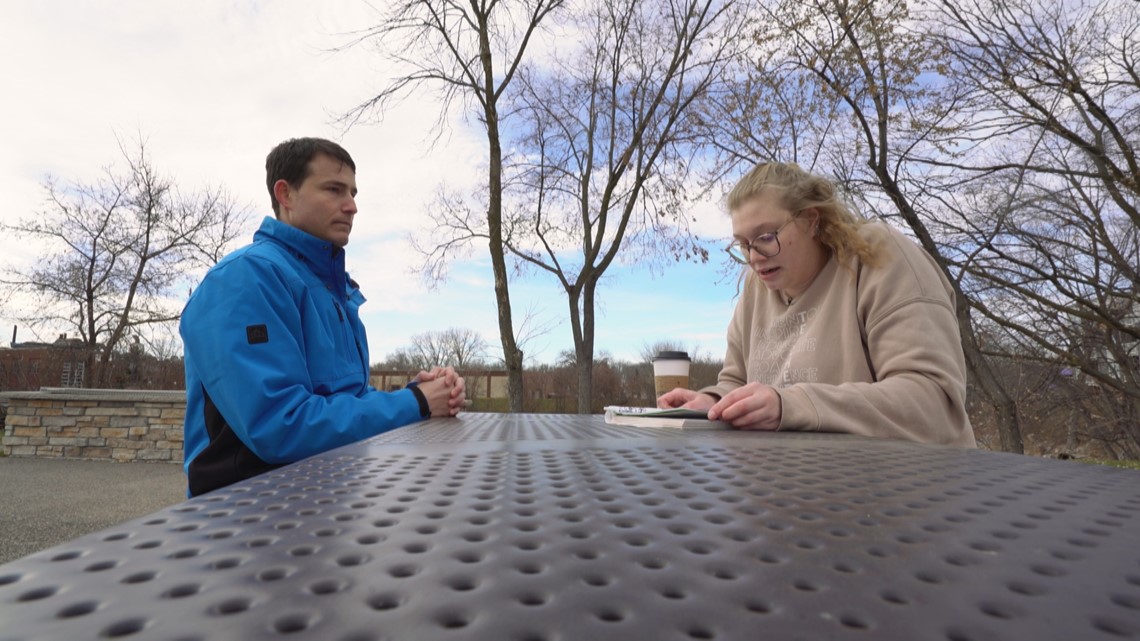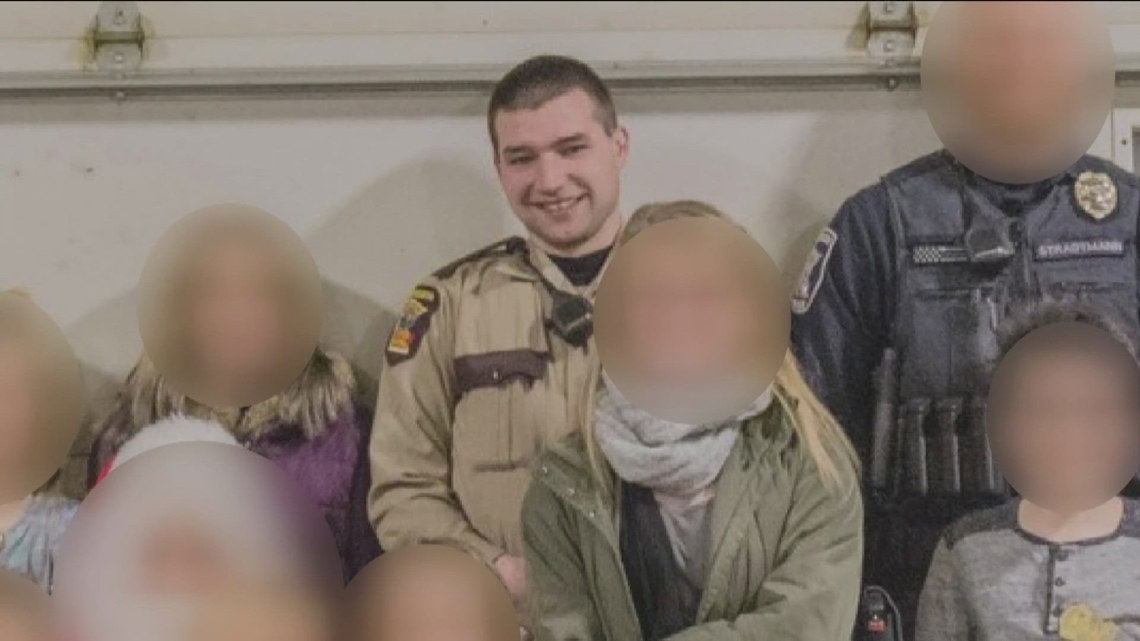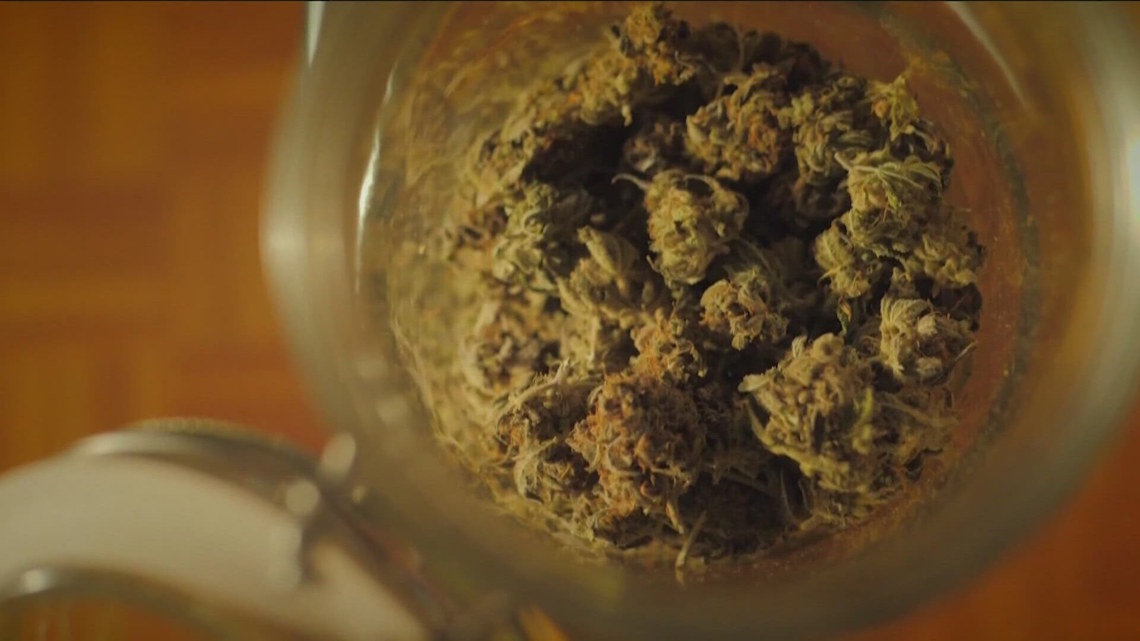Kare11
Teacher fed up with the system is doing something about it

Megan Griep, an English teacher at Fulda High School, wrote a letter to the state legislature proposing that lawmakers be required to observe classrooms first-hand.
FULDA, Minn. — Three years ago, Megan Griep moved to southwestern Minnesota to teach high school English in Fulda, a town of about 1,300 near the Iowa and South Dakota borders.
“A super small town, but it’s an amazing community,” Griep said. “I love being there.”
Griep does not regret her career path. After graduating from Delano High School in 2016, she briefly pursued a pre-law path in college but ultimately switched majors to English education as a sophomore, following in the footsteps of her mom who works as a fourth-grade teacher in the Delano Public Schools.
Embarking on a teaching career during COVID, however, has not been the easiest task.
“It’s a struggle. We have all of these kids that never got the original skills that they need, trying to build on those skills they don’t have, and we’re playing a horrible game of catch-up,” Griep said. “So many mental health issues. Home issues. Just a whole host of things and we need support.”
The pandemic’s strain on students has, in turn, led to an exodus of teachers, with up to 90 percent of districts across Minnesota reporting staffing shortages.
In Fulda, Griep said her colleagues are filling in gaps wherever needed. She calls them the “MVPs” (Most Valuable Players) of the school year. For example, one of her peers with an elementary education degree is teaching math, while another paraprofessional has stepped in to lead a history course.
“Everyone’s burned out,” Griep said. “We overwork ourselves to overcompensate for what our kids are missing. It’s a cycle. It’s a bit vicious.”
Recently, though, Griep decided to put her feelings into action. After her mother suggested she write down some of her thoughts about the public education system, Griep wrote an 1,100-word letter to state lawmakers.
Griep said she emailed the three-page document to every member of the state legislative committees on education.
I hope this letter finds you well, and that you will take the time to read and consider the proposal held within the following paragraphs. To put it in the simplest terms, America’s education system is falling apart. Teachers are fleeing the profession in unprecedented numbers, and our students are being underserved because no one wants to take accountability and support the teachers who give more of themselves than they have to offer. The current system is not sustainable, but I believe that with the proposal contained within this letter, we can take a small step into putting it back together for generations to come.


In the letter, Griep made a simple proposal. She asked lawmakers to consider crafting a bill that would require all education committee members to “physically spend time in a high school, middle school, and elementary school classroom in a rural, suburban, and urban setting,” preferably for at least three days in each environment. Griep wrote that this hands-on experience in a classroom could help legislators “fully comprehend the effects COVID has had on every kind of classroom.”
“I asked them to come into the classroom,” Griep put more simply, “to understand how their policies affect us.”
Griep said she did not receive an answer from any of the lawmakers, other than an automated response generated by their official email accounts.
After speaking with Griep, KARE 11 called DFL State Sen. Steve Cwodzinski, the chair of the Education Policy Committee who taught American government and history for 33 years at Eden Prairie High School. Cwodzinski said that he had not seen Griep’s letter, but after reviewing her proposal on Wednesday about classroom observation requirements, he spoke favorably about the possibility.
“I think it’s a great idea, because I think sometimes we lose sight of what it’s like to be a kid in a school in Minnesota today. The suburban experience is different than the urban experience and the urban experience is different than the rural experience,” Cwodzinski said. “I’d like to entertain it and hear more thoughts on it as it moves forward.”
The concept of legislators observing classrooms is not far-fetched. Just last month, in fact, Cwodzinski participated in a “Back to School” tour with some of his colleagues in the State Senate, with nearly a dozen stops at schools in St. Cloud, Duluth, Bemidji, Hibbing, Winona, and many other locations.


“I just love those opportunities that we get as legislators,” Cwodzinski said. “Maybe we don’t have to legislate doing this, but just you planting the seed in my colleagues’ heads, maybe they’ll pick up the phone and say, ‘hey, can I visit a grade school next week?'”
She’s seeking a classroom requirement enshrined into Minnesota state law, and she’ll be paying close attention to legislators when they return for the next session in February.
“I think it would be the first step in changing the education system in America,” Griep said. “It’s imploding on itself as we speak.”
With that said, Griep still has no plans to leave the profession.
She finds so much joy in the little victories, like how her seniors at Fulda High this semester have embraced her teaching of William Shakespeare’s “Macbeth.”
“My kids have finally figured out that Shakespearian language, so they’ve been insulting each other in Shakespearian language,” Griep said. “But it’s hilarious, because they’re like, ‘I feel so smart. I’m amazing. Look what I can do!’ And that’s the coolest thing to see.”
WATCH MORE ON KARE 11+
Download the free KARE 11+ app for Roku, Fire TV, Apple TV and other smart TV platforms to watch more from KARE 11 anytime! The KARE 11+ app includes live streams of all of KARE 11’s newscasts. You’ll also find on-demand replays of newscasts; the latest from KARE 11 Investigates, Breaking the News and the Land of 10,000 Stories; exclusive programs like Verify and HeartThreads; and Minnesota sports talk from our partners at Locked On Minnesota.
Watch all of the latest stories from Breaking The News in our YouTube playlist:
Kare11
Former MN State Trooper Shane Roper, charged with manslaughter, requests case dismissal


The former state trooper is charged with the killing of 18-year-old Olivia Flores.
ROCHESTER, Minn. — Editor’s Note: The above video first aired on 8/26/2024.
The former Minnesota State Patrol trooper charged with the killing of an 18-year-old girl is asking for his case to be dismissed and a change of venue for it to be moved out of Olmstead County.
The former trooper, Shane Roper, and his attorney argue that the “extensive and regional media coverage” jury pools are likely tainted and a fair trial could not be conducted in Olmstead County.
According to a criminal complaint, Roper was driving 83 miles an hour, full throttle with his lights and siren off when he sped through the busy Rochester intersection by the mall and slammed into 18-year-old Olivia Flores.
Records show he’d been suspended twice and reprimanded twice more for similar behavior.
The order from Roper’s attorney also asks the court to preclude the introduction of any evidence related to prior speeding or traffic incidents involving Roper.
Roper and his attorney are asking for charges 1-8 to be dismissed for “lack of probable cause.”
Kare11
‘This doesn’t change anything’ Biden apology for Native American boarding schools draws mixed reaction


For the very first time, a sitting President has apologized for boarding schools that tore Native Americans apart and led to countless cases of abuse and death.
MINNEAPOLIS — During his first presidential visit to Indian Country on Friday, Joe Biden delivered a historic and emphatic apology, acknowledging 150 years of abuse, trauma and death inflicted by Native American boarding schools.
“I formally apologize, as President of the United States of America, for what we did,” Biden said. “It’s one of the most horrific chapters in American history,” said President Biden.
Christine Diindiisi McCleave, former CEO of the National Native American Boarding School Healing Coalition, spent years documenting the stories of boarding school survivors and advocating for justice and accountability by the US leaders.
“My family has two generations of boarding school history that I know of,” McCleave said, during an interview for the KARE 11 Series “Lost History,” which detailed the impact of boarding schools in Minnesota.
During his speech on Friday, President Biden acknowledged the work of the Native American Boarding School Healing Coalition and efforts to better understand the horrors and generational trauma the schools inflicted.
“Generations of Native children stolen, taken away to places they didn’t know,” Biden said. “Children abused emotionally, physically and sexually abused, forced into hard labor, some put up for adoption without the consent of their birth parents. Some left for dead in unmarked graves.”
Christine Diindiisi McCleave: “I struggle with what I’m supposed to say and what I really feel.”
Kent Erdahl: “Why do you say that?”
McCleave: “Well, because today is historic and while I am grateful to see this progress being made. I am also realizing just how short it falls… from real reparations, from real healing.”
She knows she’s not the only one who feels that way. The National Native American Boarding School Healing Coalition surveyed survivors in 2016.
“The thing they wanted the least was an apology because, while it is an acknowledgement, it doesn’t change anything,” McCleave said. “The majority of them said they wanted a truth commission. Trying to find out exactly how many boarding schools existed, how many children went to those boarding schools and how many children died at those schools.”
She says an investigation led by Interior Secretary Deb Haaland, whose grandparents and mother were among those sent to these schools did help better understand that impact, but it only scratched the surface.
“They were only able to investigate the Federal Government’s records,” McCleave said. “Half of these schools were run by churches, of various denominations, and so a truth commission would be able to look into those records as well.”
“Nearly one thousand documented Native child deaths, though the real number is likely to be much, much higher,” Biden said on Friday.
Bills in both the House and the Senate could make that commission a reality, but until that happens, Christine says she can’t ignore the politics of an apology that took place in a swing state, just days before an election.
McCleave: “This apology doesn’t change anything for my mother, who was abused as a child. Of for my grandfather who was a abused at a Catholic Indian Boarding School.”
Erdahl: “Do you hope that this isn’t just an election ploy?”
McCleave: “I hope that this apology actually helps that bill get passed. Native American people are no stranger to being political pawns, so you know what, if this is an election ploy so be it, I hope something good comes out of it.”
Kare11
Hazelden addiction, recovery experts host first cannabis summit


Researchers spoke about increased THC potency and the impact on youth brain development.
ST PAUL, Minn. — Whether purchased from dealer or dispensary, weed has become more potent over the years. In 2022, the federal government reported THC levels more than tripled since 1995.
Hazelden Betty Ford Foundation Graduate School addressed this Friday at its first cannabis summit. Attendees primarily included the nonprofit’s graduate students as well as undergraduate students from nearby universities.
Speakers included researchers from the University of Minnesota, Hamline University, Mitchell Hamline School of Law and others.
Ken C. Winters, is a senior scientist at the Oregon Research Institute’s Minnesota location and a consultant for the University of Iowa’s Native Center for Behavioral Health.
He covered the interplay between youth, cannabis and health.
“It’s not your grandparents’ marijuana these days,” Winters said to the students.
The Hazelden Betty Ford Foundation Graduate school offers a 2-year program, in which students like John Ryan and William Barksdale are earning counseling degrees in substance use and mental health.
“The takeaway would be that you’ve seen potency levels increase quite a bit, and the research is trying to keep pace with that,” Barksdale said.
“As we saw today, marijuana use has gone up in the last couple years such that it’s eclipsed alcohol use in terms of daily users in the United States,” Ryan added. “It’s is much more concerning now because there is such a higher degree of potency that’s available on a wider basis.”
Ryan says it’s especially concerning for youth.
“The subject of the last presentation, which I found quite engaging, was the specific effects on adolescents,” he said. “So, teenagers and people within that young adult range, the 18 to 25-year-olds because that’s generally the period the most brain development takes place. So that’s the area of concern … but it’s still something that I think is being studied and being observed in the first stages of that.”
Kevin Doyle provided opening remarks. He has more than 35 years of experience as a licensed professional counselor. Today, he’s president and CEO of the grad school.
“Potency, dosage, frequency of use, availability, legal cutoffs in terms of age, all those things need to be talked about,” Doyle said. “Adolescent brain development. We know more and more about that every year. Sometimes it seems like every day we learn more about that.”
“How do we as a treatment community need to be prepared to respond?”
The summit comes as Minnesota works to set rules for the cannabis industry after legalizing the drug for recreational use last year. A public comment period is expected later this fall.




GIPHY App Key not set. Please check settings